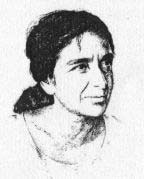
Remembering Amrita Pritam
Noted Punjabi writer and literary personality Amrita Pritam passed away last month. She was born at Gujranwala in 1919 – birthplace of legendary poet Waris Shah and prominent site of the nationalist movement in 1919. Her poetry resonated with the cultural and historical nuances of Punjab. In memory of Amrita Pritam, we carry two poems – one evoking the legacy of the Jallianwala Massacre of 1919, and one on Lenin. 
Scene 1919
These travails of life,
Compulsions, helplessness,
Shamings and humiliations,
Unfulfilled desires, forced to crawl,
Curses of slavery,
The fate of slaves,
It was a devastation That was borne
A suffering
Endured
A poison
Swallowed
A death
That was lived.
In the breast, a flame burns,
From the eyes, tears flow,
Hear hear hear hear
All that this time speaks
All that this time suffers
All that this time speaks
I’m time, a question –
A question asked by the walls
Riddled with bullets
Asked by the cries of
Thousands of souls
These withered faces, these cold corpses
Darkness, darkness
And over the lips
Guns stand guard
These wounded hopes,
These broken voices,
These bloody dawns
And black noons
Come, now come
Light up the dark,
This head will never bend,
Never bend
Before royal kings
Before Emperors
This assertion of youth
The lava bursting from the breast
Now never will stop
Never stop
These walls, these corridors,
These devastated lanes
These lanes
Soaked in sorrows, shaped by sorrows,
And see these lanes –
They’ve set out to raze down the world of slavery.
To Lenin, A Figure From My History
What kind of figure from my history are you?
Stepping out of the calendar my wall,
You change its date daily
And meet me
Like a new day!
When you step out of my calendar
And walk the streets
A sun comes out
And wherever there’s some soft corner
It laughs like a green leaf
And wherever there’s a soiled bit
It grows ashamed.
But this – so natural for you,
Is an unnatural act of history.
History breathes a sigh of relief
When it sits in the past
And is disturbed beyond bearing
When it has to deal with the present
So, for this history’s sake,
When I imprisoned you in a calendar
And sealed it with place and time,
And nailed it down with many isms
But you –
Step out of the calendar on my wall
And yet again change its date,
And new concerns, new freedom in hand,
You meet me like a new day
Your – a new day’s – greatness
Such that a deep corner of my being
Hears one note of your sun
And what, for history, is an unnatural act
But for you, natural,
Becomes natural for me.